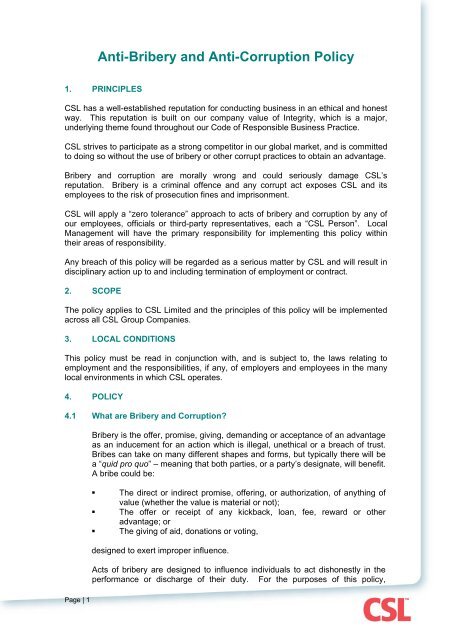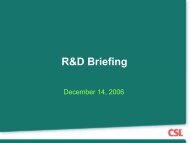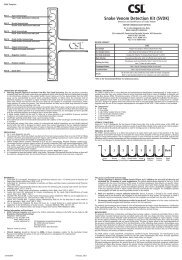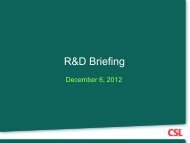Anti-Bribery and Anti-Corruption Policy - Csl.com
Anti-Bribery and Anti-Corruption Policy - Csl.com
Anti-Bribery and Anti-Corruption Policy - Csl.com
Create successful ePaper yourself
Turn your PDF publications into a flip-book with our unique Google optimized e-Paper software.
Page | 1<br />
<strong>Anti</strong>-<strong>Bribery</strong> <strong>and</strong> <strong>Anti</strong>-<strong>Corruption</strong> <strong>Policy</strong><br />
1. PRINCIPLES<br />
CSL has a well-established reputation for conducting business in an ethical <strong>and</strong> honest<br />
way. This reputation is built on our <strong>com</strong>pany value of Integrity, which is a major,<br />
underlying theme found throughout our Code of Responsible Business Practice.<br />
CSL strives to participate as a strong <strong>com</strong>petitor in our global market, <strong>and</strong> is <strong>com</strong>mitted<br />
to doing so without the use of bribery or other corrupt practices to obtain an advantage.<br />
<strong>Bribery</strong> <strong>and</strong> corruption are morally wrong <strong>and</strong> could seriously damage CSL’s<br />
reputation. <strong>Bribery</strong> is a criminal offence <strong>and</strong> any corrupt act exposes CSL <strong>and</strong> its<br />
employees to the risk of prosecution fines <strong>and</strong> imprisonment.<br />
CSL will apply a “zero tolerance” approach to acts of bribery <strong>and</strong> corruption by any of<br />
our employees, officials or third-party representatives, each a “CSL Person”. Local<br />
Management will have the primary responsibility for implementing this policy within<br />
their areas of responsibility.<br />
Any breach of this policy will be regarded as a serious matter by CSL <strong>and</strong> will result in<br />
disciplinary action up to <strong>and</strong> including termination of employment or contract.<br />
2. SCOPE<br />
The policy applies to CSL Limited <strong>and</strong> the principles of this policy will be implemented<br />
across all CSL Group Companies.<br />
3. LOCAL CONDITIONS<br />
This policy must be read in conjunction with, <strong>and</strong> is subject to, the laws relating to<br />
employment <strong>and</strong> the responsibilities, if any, of employers <strong>and</strong> employees in the many<br />
local environments in which CSL operates.<br />
4. POLICY<br />
4.1 What are <strong>Bribery</strong> <strong>and</strong> <strong>Corruption</strong>?<br />
<strong>Bribery</strong> is the offer, promise, giving, dem<strong>and</strong>ing or acceptance of an advantage<br />
as an inducement for an action which is illegal, unethical or a breach of trust.<br />
Bribes can take on many different shapes <strong>and</strong> forms, but typically there will be<br />
a “quid pro quo” – meaning that both parties, or a party’s designate, will benefit.<br />
A bribe could be:<br />
The direct or indirect promise, offering, or authorization, of anything of<br />
value (whether the value is material or not);<br />
The offer or receipt of any kickback, loan, fee, reward or other<br />
advantage; or<br />
The giving of aid, donations or voting,<br />
designed to exert improper influence.<br />
Acts of bribery are designed to influence individuals to act dishonestly in the<br />
performance or discharge of their duty. For the purposes of this policy,
whether the target of the act of bribery works in the public of private sector is<br />
irrelevant. <strong>Corruption</strong> is the misuse of office or power or influence for private<br />
gain.<br />
.<br />
4.2 Who may be guilty of <strong>Bribery</strong> <strong>and</strong> <strong>Corruption</strong>?<br />
Page | 2<br />
In the eyes of the law, bribery <strong>and</strong> corruption can be <strong>com</strong>mitted by:<br />
An employee, officer or director; or<br />
Any person acting on behalf of another (i.e. a third-party<br />
representative); or<br />
Organisations which authorize, permit or facilitate others to carry out<br />
such acts.<br />
People who are likely to be approached with bribes or corrupt conduct are<br />
generally those who are able to obtain, retain or direct business, or government<br />
officials involved in some aspect of the regulation or purchase of a <strong>com</strong>pany’s<br />
products <strong>and</strong> services, for example, tendering <strong>and</strong> contracting, or the h<strong>and</strong>ling<br />
of administrative tasks such as licences, customs, taxes or import/export<br />
matters. For the purposes of this policy, a “government official” could be:<br />
A public official, whether foreign or domestic;<br />
A political c<strong>and</strong>idate or party official;<br />
A representative of a government-owned/majority-controlled organization<br />
or a representative carrying out public services, e.g. healthcare services;<br />
An employee of a public international organisation (e.g. World Bank); or<br />
A healthcare professional working for a government or other public health<br />
institution.<br />
4.3 <strong>Bribery</strong> <strong>and</strong> <strong>Corruption</strong> Laws <strong>and</strong> Enforcement<br />
<strong>Bribery</strong> is a criminal offence <strong>and</strong> penalties can be severe for both <strong>com</strong>panies<br />
<strong>and</strong> individual employees.<br />
There is legislation in many countries, including Australia (the Criminal Code<br />
Act), the United States (the Foreign Corrupt Practices Act <strong>and</strong> <strong>Anti</strong>-Kickback<br />
Statute) <strong>and</strong> the United Kingdom (the <strong>Bribery</strong> Act), that prohibit bribery <strong>and</strong><br />
corruption <strong>and</strong> are enforced with vigour by their respective enforcement<br />
authorities. Acts of bribery <strong>and</strong> corruption <strong>com</strong>mitted overseas may well result<br />
in a prosecution at home <strong>and</strong> in other jurisdictions.<br />
4.4 <strong>Bribery</strong> <strong>and</strong> <strong>Corruption</strong> Prevention<br />
A. Risk Assessment<br />
Local Management must assess the vulnerability of each business unit<br />
to bribery <strong>and</strong> corruption risks. Where bribery <strong>and</strong> corruption risks are<br />
identified they should be managed in line with CSL’s established risk<br />
management framework.<br />
B. Accurate Books <strong>and</strong> Record-Keeping<br />
Local Management must ensure that books, records <strong>and</strong> overall financial<br />
reporting must also be transparent. That is, they must accurately reflect<br />
each <strong>and</strong> all underlying transactions.
Page | 3<br />
C. Effective Monitoring <strong>and</strong> Control<br />
Local Management must take the necessary steps to maintain an<br />
effective system of internal control <strong>and</strong> monitoring to prevent bribery <strong>and</strong><br />
corruption. This must include education <strong>and</strong> training of employees.<br />
Local Management must provide a sign off to the CSL Group Financial<br />
Officer as part of the annual management representation process that<br />
the business that they are responsible for has assessed the vulnerability<br />
of its operations to bribery <strong>and</strong> corruption risks, that appropriate controls<br />
<strong>and</strong> monitoring have been put in place to prevent bribery <strong>and</strong> corruption<br />
<strong>and</strong> that there have to the best of their knowledge been no instances of<br />
bribery or corruption that have not otherwise been reported to Senior<br />
Management or CSL Legal.<br />
4.5 Key Risk Areas for <strong>Bribery</strong> <strong>and</strong> <strong>Corruption</strong><br />
A. Gifts, Entertainment <strong>and</strong> Hospitality<br />
Gifts, entertainment <strong>and</strong> hospitality include the receipt or offer of gifts,<br />
meals or tokens of appreciation <strong>and</strong> gratitude, or invitations to events,<br />
functions, or other social gatherings, in connection with matters related<br />
to our business. These activities are acceptable provided they:<br />
fall within reasonable bounds of value <strong>and</strong> occurrence as<br />
defined by CSL policies;<br />
do not influence, or are not perceived to influence, objective<br />
business judgement; <strong>and</strong><br />
are not prohibited or limited by applicable laws or applicable<br />
industry codes.<br />
CSL Persons must not accept gifts or entertainment where to do so<br />
might influence, or be perceived to influence, objective business<br />
judgement.<br />
As a general rule, CSL Persons should not provide any gifts to, or<br />
receive them from, government officials. With the prior approval of CSL<br />
Legal, rare exceptions may be permitted where a gift is an important<br />
local/cultural custom, <strong>and</strong> any such gift is permitted under applicable law<br />
<strong>and</strong> is of nominal value.<br />
How to evaluate what is “acceptable”<br />
First, each CSL Person must take a step back <strong>and</strong> ask the following<br />
when giving or receiving any gift, entertainment or hospitality:<br />
What is the intent – is it to build a relationship or is it something<br />
else?<br />
How would this look if these details were reported on the front of<br />
a newspaper?<br />
What if the situation were to be reversed – would there be a<br />
double st<strong>and</strong>ard?
Page | 4<br />
If a CSL Person finds it difficult to positively answer one of the above<br />
questions, there is a risk involved that the gift, entertainment or<br />
hospitality could be, or could appear to be, improper <strong>and</strong> could<br />
potentially damage CSL’s reputation <strong>and</strong> business. The action could<br />
well be unlawful.<br />
Although no two situations are the same, the following guidance should<br />
be considered globally:<br />
Never acceptable<br />
Circumstances which are never permissible include examples that<br />
involve:<br />
A “quid pro quo” (a benefit or advantage offered for something in<br />
return);<br />
Gifts in the form of cash/or cash equivalent vouchers;<br />
Entertainment of a sexual or similarly inappropriate nature; or<br />
Making in<strong>com</strong>plete, false or inaccurate entries in CSL’s books<br />
<strong>and</strong> records.<br />
Sometimes acceptable<br />
Activities that may be acceptable depending upon the particular<br />
jurisdiction <strong>and</strong> the particular person CSL does do business with include:<br />
Modest/occasional meals;<br />
Occasional attendance at ordinary sports, theatre <strong>and</strong> other<br />
cultural events; or<br />
Gifts of nominal value, such as pens, or small/low value<br />
promotional items.<br />
If the person CSL does business with is a healthcare professional or<br />
government official there are often local laws <strong>and</strong> applicable industry<br />
codes that would further restrict activities that may be considered<br />
acceptable if the person was not a healthcare professional. Such further<br />
restrictions must always be adhered to.<br />
If an example does not fall under the above categories, please in the<br />
first instance seek guidance from CSL Legal. Generally, such examples<br />
would not be permissible without prior approval.<br />
Determining Acceptable Value<br />
A variety of factors such as local laws, applicable industry codes,<br />
customs, culture <strong>and</strong> currency may influence the level of acceptability.<br />
Local Management – subject to approval by Regional/Divisional<br />
Management <strong>and</strong> CSL Legal – must establish a monetary range of<br />
acceptable values for gifts, meals <strong>and</strong> entertainment for each business<br />
unit.<br />
B. Facilitation Payments<br />
A facilitation payment is a small payment made to a government official<br />
to secure or expedite the performance of a routine or necessary action
Page | 5<br />
(for example, the issue of a permit or license) to which the payer of the<br />
facilitation payment is entitled.<br />
As a general rule, it is CSL’s policy that facilitation payments must<br />
not be made.<br />
In the event that a CSL Person encounters a request for, or a perceived<br />
need for, a facilitation payment, the CSL Person must notify CSL Legal.<br />
In limited circumstances, where not prohibited by local or applicable<br />
laws, <strong>and</strong> where not in contravention with this policy, a facilitation<br />
payment may be approved by CSL Legal. In all such cases, the<br />
payment must be appropriately <strong>and</strong> accurately recorded within CSL’s<br />
books <strong>and</strong> records to reflect the substance of the payment <strong>and</strong> the<br />
underlying transaction.<br />
If a CSL Person is unsure whether a certain payment is considered a<br />
facilitation payment, please contact CSL Legal.<br />
C. Political Donations, Charitable Donations <strong>and</strong> Sponsorships<br />
Neither CSL nor any CSL Person may make any direct or indirect<br />
contribution to any political party, organisation or individual engaged in<br />
politics as a way of obtaining an improper advantage in CSL’s business.<br />
CSL must ensure that any charitable contribution or sponsorship is not<br />
being used as a subterfuge for bribery.<br />
All political donations, charitable donations <strong>and</strong> sponsorships must be<br />
made in accordance with applicable local laws <strong>and</strong> regulations <strong>and</strong> in<br />
accordance with CSL’s authorisations <strong>and</strong> delegations framework.<br />
D. Use of Third Party Representatives<br />
For the purposes of this policy, the term “third-party” includes anyone<br />
who is not a CSL employee or CSL official (e.g. Board Member). As<br />
such, a “third-party” includes agents, distributors, consultants <strong>and</strong> joint<br />
venture partners. Risk can be identified where a third-party conducts<br />
business activities on CSL’s behalf or distributes CSL’s products, so that<br />
the result of their actions can be seen as benefiting CSL. Third-parties<br />
who act on CSL’s behalf or distribute CSL’s products must operate<br />
at all times in accordance with CSL’s Code of Responsible<br />
Business Practice <strong>and</strong> this policy. Local Management of the CSL<br />
contracting party is responsible for the evaluation of each third-party<br />
relationship <strong>and</strong> assessing risk. Where potential risk regarding a thirdparty<br />
arrangement has been identified, Local Management must:<br />
Evaluate the background, experience, <strong>and</strong> reputation of the<br />
third-party;<br />
Underst<strong>and</strong> the services to be provided, <strong>and</strong> methods of<br />
<strong>com</strong>pensation <strong>and</strong> payment;<br />
Evaluate the business rationale for engaging the third-party;<br />
Take reasonable steps to monitor the transactions of the thirdparty;
Page | 6<br />
Ensure there is a written agreement in place which<br />
acknowledges the third-party’s underst<strong>and</strong>ing of <strong>and</strong><br />
<strong>com</strong>pliance with CSL’s Code of Responsible Business Practice<br />
<strong>and</strong> this policy; <strong>and</strong><br />
Establish a process to conduct regular reviews of the thirdparty’s<br />
ongoing underst<strong>and</strong>ing <strong>and</strong> <strong>com</strong>pliance with CSL’s<br />
Code of Responsible Business Practice <strong>and</strong> this policy.<br />
4.6 How to Raise a Concern<br />
All CSL Persons have a responsibility to help detect, prevent <strong>and</strong> report<br />
instances not only of bribery <strong>and</strong> corruption, but also of any other suspicious<br />
activity or wrongdoing in connection with CSL’s business. CSL is absolutely<br />
<strong>com</strong>mitted to ensuring that all CSL Persons have a safe, reliable, <strong>and</strong><br />
confidential way of reporting any suspicious activity.<br />
CSL has established <strong>and</strong> will continue to maintain multiple channels that<br />
facilitate the reporting of any suspected incidence of bribery or corruption.<br />
A CSL Person may report the issue/concern to their Line Manager or to CSL<br />
Legal in the first instance. If for some reason it is not possible to speak to their<br />
Line Manager or CSL Legal, then the issue/concern should be reported to<br />
another Senior Manager, the Company Secretary, or the Director of Corporate<br />
Responsibility.<br />
If a CSL Person is are not <strong>com</strong>fortable with speaking directly to a colleague or<br />
anyone mentioned above, CSL has a reporting or “whistleblower” facility or<br />
“hotline” for all CSL Persons to use. Details of this have been <strong>com</strong>municated<br />
separately.<br />
In the event that an incident of bribery, corruption, or wrongdoing is reported,<br />
CSL will act as soon as possible to evaluate the situation. CSL has clearly<br />
defined procedures for investigating fraud, misconduct <strong>and</strong> non-<strong>com</strong>pliance<br />
issues <strong>and</strong> these will be followed in any investigation of this kind. In addition to<br />
any internal procedures, this includes the referral to appropriate government<br />
enforcement agencies. Any questions about these procedures should be<br />
directed to CSL Legal.<br />
The <strong>Anti</strong>-<strong>Bribery</strong> <strong>and</strong> <strong>Anti</strong>-<strong>Corruption</strong> <strong>Policy</strong> was adopted by the Board on 19<br />
July 2011.






